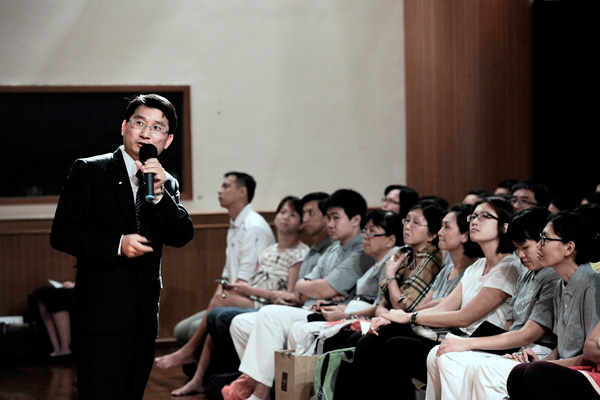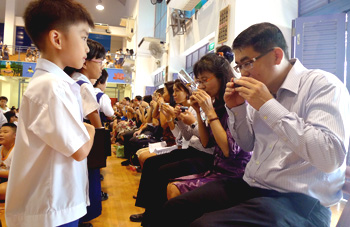
In the “Family Fun” segment, the camp participants wrote their heartfelt words of gratitude and blessings on pieces of coloured paper and folded them into colourful paper airplanes, to bestow these blessings at each other. Photo by Ng Sher Lin
“Tzu Chi Kungfu First Move: Clench your hands into fists. Divide a watermelon into half; give one half to the people on the left and the other half to the people on the right ‒ this move is called ‘the Paramita of Giving’.”
The lively activity of “Tzu Chi Kungfu” broke the silence of Tzu Chi Singapore’s Jing Si Hall with joyful laughter on 19th May 2017. It signaled a boisterous start to the two days and two nights’ Tzu Ching (Tzu Chi Collegiate Youth Association) leadership camp themed, “Sunshine, Hope and Love”, which was attended by Tzu Ching’s committee members from various tertiary institutions around Singapore. The camp programme was presented in lively and innovative formats that were in tune with the youths of today, and included interesting sharing by various speakers, inspiring talks, moving video news and stories, and fun and challenging games.
Does a veteran Tzu Ching committee member really know how to communicate with his team mates and work with them in mutual trust? Through various types of games, the camp allowed the participants to experience if they truly understood their team partners’ intentions while interacting with them.
In one particular game titled, “The Temperature Between People”, participants had to “deliver” bentos to team mates through the use of drawings. The laughter-inducing game not only brought the youths closer, but also drew out precious lessons in empathy while being entertaining at the same time: “Is your ideal bento acceptable to your partner’s palate?”
Sometimes in life, we may be passionate to share, but is the other person ready to receive as well? While it is important to share, it is more important to have empathy for the other person, so as to understand their needs and give what is appropriate for them. This little gem of wisdom imparted through the game was worth deeper consideration by every Tzu Chi Collegiate Youth.
In the “Back-to-Back Hug” game segment, two youths formed a team each, with their backs to each other. One of them described the bento he had drawn, while his team mate asked clarifying questions before attempting to mimic the drawing without seeing the original picture. Through this simple activity, the youths learned the techniques of effective communication, which would ultimately affect the fruits of a team’s collaborative efforts.

The students gained an understanding of the importance of effective communication through the “Back-to-Back Hug” game segment. Photo by Chua See Siew
The Tzu Chi Collegiate Youths not only faced the difficulties of the games’ challenges, but also encountered problems from their team members. Should a team sacrifice any of its team members so as to save the team from defeat? These challenges really tested the wits of many of the youths; in fact, this is a harsh reality that any working team or group may face in real life.
“Perhaps one person can travel faster; but a group of people can travel longer and farther.” Every game station provided plenty of opportunities for group interaction and teamwork, which served to inspire the youths as well as enabled them to gain new insights.

In this game, team members work cooperatively to build a strong and tall “pagoda”. Photo by Ng Sher Lin

Students share their heartfelt thoughts with each other by reading out what their team mates have written. Photo by Ng Sher Lin
Bearers of Light
“Does a ‘seed’ need to bear heavy responsibilities?” Tzu Ching senior Jamie had once asked this question of herself. The young lady, who received her Tzu Chi volunteer certification at the age of 21, is a Christian. She was introduced to Tzu Chi by her aunt, Lim Chwee Lian, a veteran Tzu Chi commissioner. Through her participation in the stage adaptation of the “Sutra of Profound Gratitude to Parents” as well as involvement in international disaster relief missions, she came to realize that every person is like a ‘seed’, and that Dharma water is present everywhere. As long as each person continues to water himself with the water of Dharma, the wisdom within him will continue to grow.
In every stage of the Tzu Chi Path, one will have different journey companions; but everyone’s heart is geared towards the same direction. In the segment, “A Seed Arises from an Aspiration”, Jamie expressed her gratitude to Tzu Chi as her spiritual pillar of support. “After so many years of involvement with Tzu Chi, I have never regretted my decision to join the Tzu Chi family,” she shared.
Another Tzu Ching senior, Ng Yean Shin, got connected with Tzu Chi at a Tzu Chi Collegiate Youth Camp in 2003. At that time, she deeply admired the life of the (late) Mother Teresa, and hoped to one day serve people in a hospital that she had established. Later, she enrolled in the Nursing course at Nanyang Polytechnic, and during her internship, she and her colleagues frequented night spots. Even though these night spots were close to Tzu Chi’s former premises in Chinatown, she had no intention of returning to the organization then.
In 2013, she saw some friends wearing the uniform of Tzu Ching in her school grounds one day, and this was when she started to re-connect with Tzu Chi. The Tzu Ching shirt has a logo showing a pair of hands carrying a lit candle, and the image left an indelible mark in her heart that day. She was struck by the thought: "Tzu Chings serve as the bearers of light, lighting up the path for others".
During her three and a half years working as a nurse in a hospital, Yean Shin was really afraid of becoming a “robot” ‒ being emotionally numb as a result of witnessing too many deaths, or looking at each patient with a cold/detached attitude. However, after joining a training camp in Hualien, her heart was re-ignited with passion after sitting through a lesson on humanistic medical care. From her participation in Tzu Chi’s overseas medical aid missions, Yean Shin witnessed and realized how Tzu Chi’s medical association, TIMA, could bring intangible humanistic values to the locals through education and sow the seeds of love and goodness many people’s hearts.
Liang Xiao Jun, who is a second year nursing student, said, “As we work in the hospital, we may gradually become ‘robotic’ after witnessing the deaths of numerous people. But apart from work, we can actually recharge ourselves by connecting with Tzu Chi, to prevent ourselves from turning into an emotionless person. Sister Yean Shin is my role model.”
Being Content with Life
Drug abuse, smoking, drinking, compulsive gambling and even family violence ‒ these were the numerous vices of Tzu Chi volunteer Lee Teck Hock. They were his recurrent nightmares and evil compulsions that used to bog him down, and thus his family was also implicated. Lee was one of the invited speakers at the camp, and he shared with the gathered youths the wantonness of his life in the past.
“Of course, it is not easy to be in Tzu Chi; but whenever I came to Jing Si Hall and saw the picture of Jing Si Abode on the wall, I will always remember what Master Cheng Yen said: 'It is not easy to be born as a human in this life. We came into this life empty-handed and will leave one day equally empty-handed, so we must bring the Dharma instead of negative karma with us (to the next life)'.”

Volunteer Lee Teck Hock (right) sharing his past vices of smoking, drinking, gambling and generally wanton lifestyle in the past at the Tzu Ching leadership camp. Photo by Chua See Siew
During Lee Teck Hock’s sharing, a pair of eyes below the stage was fully focused on him while listening intently to every spoken word.
“Brother Teck Hock’s sharing reminded me of my father’s strict discipline in my childhood, and how his fiery temper often inflicted harm on my mother. But those days have changed over time since the passing away of my mother,” shared Malaysian NTU student Peng Hong Bin.
Just before his mother passed away, Hong Bin’s father received the invitation of Tzu Chi Malaysia’s volunteers to join their recycling activities. As his mother laid bedridden from illness, Tzu Chi volunteers often came to show their concern, and even offered their assistance with funeral arrangements after she passed away. These kind acts left a deep impression in him.
As he was busy with school work and extra-curricular activities in the university, Hong Bin didn’t have an opportunity to link up with the Tzu Chi Collegiate Youth Association. It was only during this school holiday that he managed to join the Tzu Ching leadership camp. He said, matter-of- factly, “I am very thankful to my (late) mother for allowing me to learn to be independent, and thankful for the company of volunteers, who kept me on the straight and narrow path. This opportunity to be in Tzu Chi really feels like a homecoming to me.”
Veteran volunteer Ng Chye Hock had experienced the hardships of bearing the heavy burden of a loved one’s medical expenses as a result of chronic illness, and as the family’s sole bread winner, he was bound by many negative feelings that often left him with a desperate feeling of wanting to “end it once and for all” by committing suicide. Thankfully, during the lowest point in his life, Tzu Chi volunteers appeared and gave him help. After gaining an understanding of his situation, they used various tactful approaches to assist him, providing him with financial aid and emotional support.
“I can never forget the kindness of the Tzu Chi brothers and sisters. As long as I am able, I will pay them back bit by bit,” he said. It was through the care and support from the volunteers that gave Ng Chye Hock the courage to continue his life journey.
Through his first involvement in a Tzu Chi free clinic mission in Batam in 2003, he came to realize his own blessings in the light of the suffering he had witnessed. “Perhaps we may think that our lives are bitter, but there will always be people who are living in worse situations than ourselves. We should always strive for contentment in life, treasure our blessings, and not indulge in self-pity.”
Ng also reminded the students listening intently below the stage: “As we practise the Tzu Chi Path, we must not forget to first take care of our own homes and career. Only then can we concentrate on the work of Tzu Chi’s Missions. Managing our family is our ‘homework’ in this life, while the Missions are our ‘homework’ life after life.”
Courage to Take Responsibility Overcomes Self Limitations
During this camp, the convenience of technology was brought into full use. The students were able go online and interact with the invited speakers remotely via the web-based Sli.do audience interaction application. In this age of technological advancement, an age of “information explosion”, being able to tell what is right from wrong, and being able to make a moral stand of doing what is right has also become a major challenge to modern youths.
Tzu Ching senior Chan Wai Hoe shared with the camp participants his work experience in the media sector. As he spoke of the real-life challenges of working in the media industry, he revealed that there were times when he wanted to report the truth in news items, but often had to give in to pressures from various areas, and could ultimately only present half-truths to news readers.
Chan also shared his experience during a Tzu Chi relief distribution in Afghanistan, where he saw a 3-year-old child acting as the head of the household as he came forth to receive relief goods. The little boy had to take care of his younger siblings. He witnessed how the cruelties of war had made children refugees, and how they were being forced by harsh realities to grow up very quickly. These heart-wrenching scenes left an indelible mark in his memory. There are too many injustices in this world, and he reminded the students the need to discern between right and wrong and to cultivate an independent mindset.

Tzu Ching senior Chan Wai Hoe sharing his invaluable professional experiences with camp attendees. Photo by Mulias Lian
Life presents us with a myriad of challenges, but how do we insist on doing good while overcoming obstacles? This moral dilemma was promptly addressed by Tzu Ching senior Yeoh Kuan Seong. Firstly, Yeoh invited every youth to imagine themselves as a superhero, and list down their short-term as well as long-term goals, and then ponder over how they might overcome obstacles to achieve their goals in a week’s time. A series of guiding questions led the students to quietly think for themselves: “What do I really want in life? Is my current life leading me towards or away from my goals?”
“If something is right, we should just do it.” This is a familiar Jing Si Aphorism, but can one truly use the right means to achieve the right ends? Are we able to bide our time and patiently work hard towards our goals? Yeoh further encouraged the students to take up activities that would spur their personal growth, using himself as an example. He has always reminded himself of the urgency of Master Cheng Yen’s words, “time is running out (to save the world from disasters)" to spur himself on, and believed that only by bearing responsibilities would he be able to transcend himself and surpass his own limitations.
The concept of "time is running out" is, coincidentally, in line with Singapore’s campaign to awaken Singaporeans to the reality of terrorist threats lurking among us via the terror alert posters with a similar slogan of “Not If, But When”. This is a clear reminder for residents to be mindful of danger while living in a relatively safe country. It is not a matter of whether such a disaster will happen but a question of when.
Another student from NTU, Wu Ming Xiu, since coming into contact with Tzu Ching, has felt the importance of self-improvement, and realised that he had wasted much time in unimportant things in the past. Hence, he started diligently attending Master Cheng Yen’s early morning Dharma talks, and took part in recycling activities, nursing home visits, etc., striving to cultivate an enriching life.
At the same time, Wu also felt anxious and powerless in the face of the many disasters afflicting the world and sensed the urgency to do more to help people in need. Yeoh's sharing on time management gave him many pointers on how to better manage his own time, which helped calm his anxieties and strengthen his resolve to strive ahead on the Tzu Chi Path.
The Tzu Ching leadership camp not only stirred the initial aspirations of the youths, but also enabled them to discover love and companionship in strengthening them for their life journey ahead. With a stronger faith and conviction, they will be able to leverage on what they have learned to inspire more youths in their schools to join their ranks and work for the betterment of humanity.



